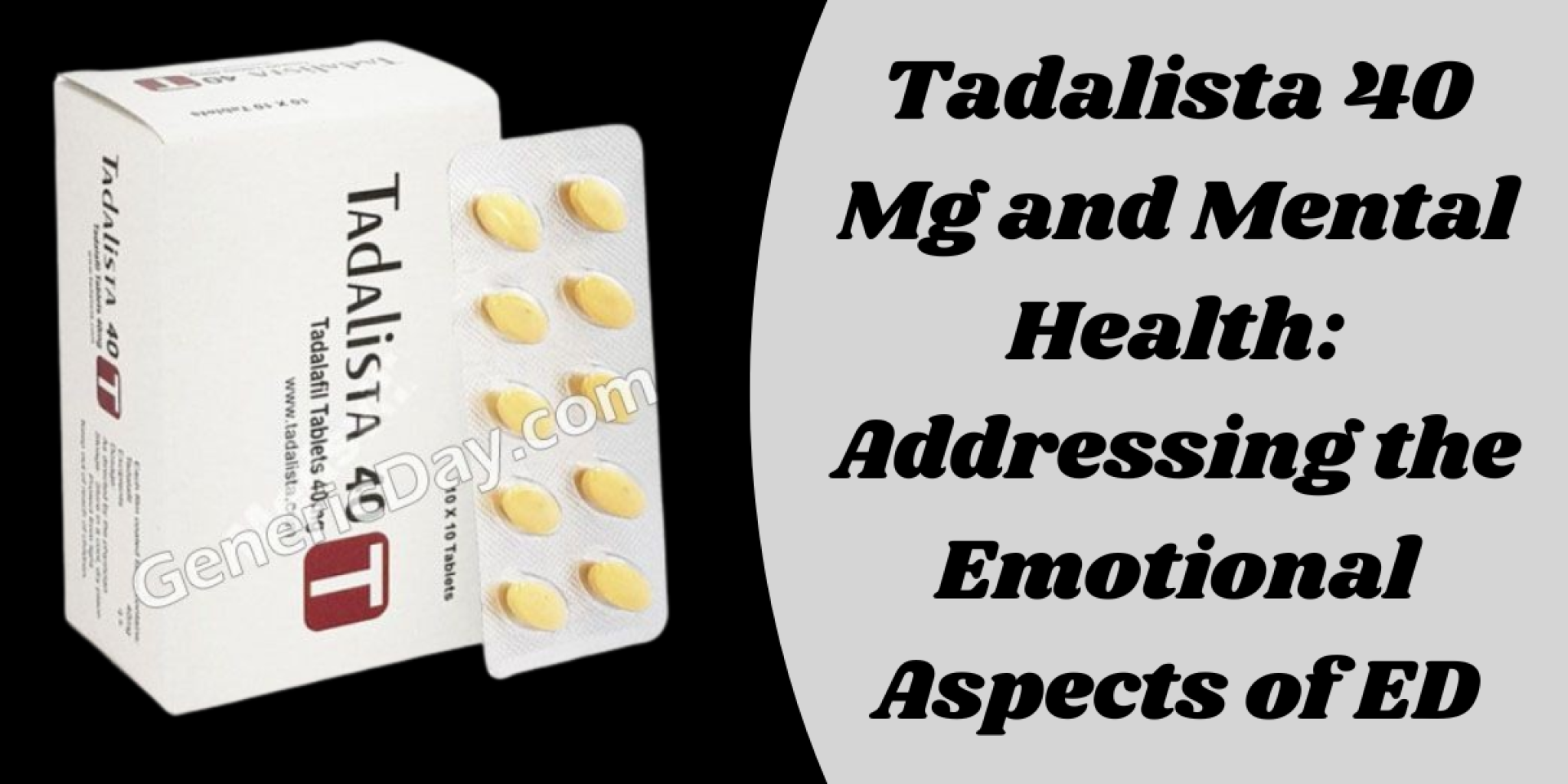Tadalista 40 Mg and Mental Health: Addressing the Emotional Aspects of ED
 0
0
Posted: Thu July 24 10:56 AM IST
Business: My Business Name
Tags: tadalista 40 mg

Erectile dysfunction (ED) is often considered a physical health issue, but its effects go far beyond the body. For many men, the emotional toll of ED can be just as significant—if not more so—than the inability to maintain an erection. This article explores how Tadalista 40 , a commonly prescribed ED medication, plays a role not only in restoring sexual function but also in supporting mental and emotional well-being.
Understanding Erectile Dysfunction Beyond the Physical
Erectile dysfunction can be triggered by physical factors such as poor blood flow, diabetes, or hormonal imbalances. However, the condition also has a profound psychological component. Many men dealing with ED report experiencing anxiety, low self-esteem, frustration, and even depression. The fear of sexual failure can create a cycle of performance anxiety, where stress about maintaining an erection becomes a self-fulfilling prophecy.
Over time, untreated ED can damage intimate relationships, reduce quality of life, and lead to social withdrawal. This makes it essential to address not only the physical symptoms of ED but also the emotional struggles that often accompany them.
Tadalista 40 Mg: An Overview
Tadalista 40 mg contains Tadalafil, a phosphodiesterase type 5 (PDE5) inhibitor that works by increasing blood flow to the penis. It helps men achieve and maintain an erection when sexually stimulated. Unlike some other ED medications, Tadalafil has a longer duration of action—up to 36 hours—earning it the nickname “the weekend pill.”
Doctors often prescribe Tadalista 40 mg for men with moderate to severe ED, particularly when lower doses have proven ineffective. While the medication does not "cure" ED, it provides the necessary support for successful sexual performance, which can lead to significant improvements in self-confidence and emotional well-being.
How Improved Sexual Function Affects Mental Health
One of the most immediate benefits of using Tadalista 40 mg is the restoration of sexual function, which can greatly enhance a man’s self-esteem. Regaining control over one’s sexual performance often translates into reduced anxiety and a stronger sense of masculinity.
Positive sexual experiences also help to rebuild emotional intimacy in relationships. Partners may feel more connected, communication may improve, and trust can be restored—all of which contribute to better mental health. The ripple effects of improved bedroom performance often extend to other areas of life, such as work, social interactions, and physical health.
Emotional Considerations When Using Tadalista 40 Mg
Despite its effectiveness, Tadalista 40 mg should not be seen as a “magic bullet.” Emotional healing takes time, and expectations should be realistic. Some men may still experience psychological barriers to intimacy even after regaining physical capability.
In these cases, combining medication with psychotherapy or counseling can be highly beneficial. Talking with a mental health professional can help address deeper emotional issues, such as fear of intimacy, relationship trauma, or chronic stress.
It’s also important for men to communicate openly with their partners. Discussing ED, the role of medication, and emotional needs can strengthen the relationship and reduce feelings of shame or guilt.
Coping Strategies for Mental Wellness During ED Treatment
In addition to medication and counseling, lifestyle changes can support both mental and sexual health. Consider the following:
- Practice mindfulness and stress-reducing techniques like deep breathing or meditation to ease anxiety
- Join support groups or online forums where men share similar experiences
- Adopt a healthy lifestyle, including regular exercise, a balanced diet, and quality sleep
- Limit alcohol and avoid recreational drugs, which can worsen both ED and mental health
These steps, when combined with Tadalista 40 mg, can create a comprehensive treatment approach.
Talking to Your Doctor About Mental Health and ED
Many men are hesitant to bring up emotional concerns when discussing ED with their doctors. However, it’s crucial to approach ED as a mind-body issue. Be honest with your healthcare provider about your mental health, stress levels, and relationship dynamics.
Ask questions such as:
- Can ED be related to my anxiety or depression?
- Will Tadalista 40 mg affect my mood or mental state?
- Should I consider therapy alongside medication?
A healthcare provider can guide you toward a treatment plan that addresses both physical and emotional needs.
Conclusion
Tadalista 40 mg can play a transformative role in a man's life by restoring sexual function and rebuilding confidence. However, mental health must be part of the conversation. Addressing the emotional aspects of ED through therapy, communication, and healthy lifestyle habits leads to better long-term outcomes. Don’t suffer in silence—seek help, stay informed, and take proactive steps toward both physical and emotional recovery.
Comments
Please login above to comment.
